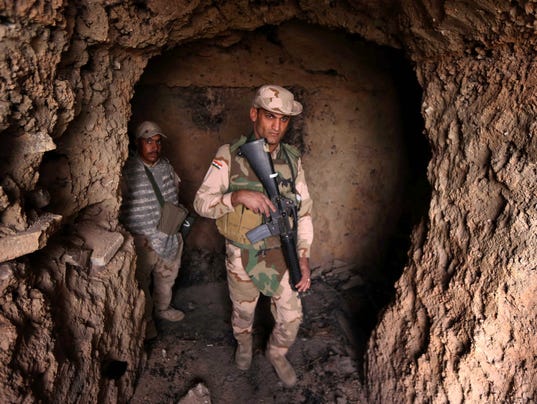Article 1
Israel Comes to the Aid of the Faltering Palestinian Economy
With donor aid to the Palestinian Authority plummeting, Israel takes steps to help stabilize the territories, even if they indirectly assist Hamas.
Wall Street Journal, Nov. 16, 2016

PA President Mahmoud Abbas is facing a a budget shortfall of roughly $500 million, but the Israeli government is trying to assist with the financial crisis.
TEL AVIV—Faced with increasingly dire economic conditions in the Palestinian territories, Israel is trying to keep the cash-strapped Palestinian Authority afloat, even if it indirectly helps Hamas, its longtime enemy.
The Authority, based in the West Bank city of Ramallah, lost control of the Gaza Strip to Hamas in 2007, but more than a third of its annual budget still goes to the coastal enclave.
But that arrangement, which helped keep Gaza functioning, is faltering, as the donor aid upon which the Authority depends plummets. That assistance is forecast to fall to $600 million this year, less than half the amount three years ago, according to the World Bank.
Gulf benefactors such as Saudi Arabia, confronted with falling oil revenues and tough choices, are redirecting funds their allies in Iraq, Syria and Yemen. U.S. funding, which goes straight to the Authority’s creditors, has dropped from about $100 million in 2014 to roughly $75 million last year, according to a U.S. official.
With wars and humanitarian crises roiling the region, that figure is expected to tumble even further this year. Worse yet for the Authority, local banks are no longer lending it money and it can no longer borrow from its public pension fund, its previous answer to short-term budget shortfalls.
Adding to the uncertainty is the political transition under way in Washington.
Amid signs the incoming Trump administration won’t force a solution to the Israeli-Palestinian conflict, conservative members of Prime Minister Benjamin Netanyahu’s coalition government have called for a rejection of the two-state solution, which is official Israeli policy, and annexation of parts of the West Bank. Under such a scenario, it isn’t clear the Authority would continue to exist.

With evidence already accumulating months ago that the Authority was facing economic collapse, however, Israel didn’t wait for the outcome of U.S. elections. To stave off fresh unrest and violence in Gaza—and the growth of even more radical Palestinian political factions on its doorstep—it entered the breach.
Under the internationally backed Oslo Accords reached in the 1990s, Israel levies taxes on goods and services imported into the territories. It collects health, social security and other benefits from firms in Israel that employ Palestinians, and then transfers these taxes and revenues to the Palestinian Authority each month, taking a fee for doing so.
Using that mechanism, Israel so far this year has transferred about one billion shekels ($262 million)—or nearly 8% of Palestinian total Palestinian revenues—in one-off payments to the Authority, according to the World Bank, the International Monetary Fund and a person familiar with the transfers.
The two sides also agreed in September to restructure $500 million in debts that the Authority owed to the state-owned Israel Electric Corporation for power supplied to the West Bank, another indication of their deeply intertwined economies.
Meanwhile, to boost the Authority’s tax revenue, Israel has issued work permits to Palestinians to work in Israel.
Israeli authorities say the prospect of the Authority’s economic breakdown and even more tumult in Gaza is worse than the risk of indirectly sustaining Hamas, the Islamist military and political movement that has vowed for Israel’s destruction and fought Israel in three wars in the past eight years.
“A stable Palestinian Authority economy is in Israel’s interests economically, politically, and in terms of security,” Finance Minister Moshe Kahlon said at the signing of electricity deal in September.
Even with the one-off money transfers from Israel, however, the Authority and its president, Mahmoud Abbas, still have to plug a budget shortfall of roughly $500 million, according to the IMF, and traditional sources for meeting deficits are now running thin.
To reduce the deficit this year, it will likely be forced to cut the salaries and benefits of civil servants at a time of weak economic growth and high unemployment, the World Bank and IMF have predicted.
“The PA’s coping strategy is thus reaching its limits,” the World Bank said in a report in September, referring to the Authority.
Any cuts to wages or social welfare programs would come at a tense time in Gaza. Unemployment is hovering at 40% and half of territory’s 1.7 million inhabitants receive some form of humanitarian aid, the World Bank says.
Employees of the Authority, which operates a bureaucracy alongside Hamas’s, fear salary cuts and job losses. Also in jeopardy, they say, are salaries for teachers and doctors, and the hundreds of millions of dollars in cash and food assistance the Authority provides. Hamas has recently arrested journalists for attacking its policies.
Nerves are also fraying in the West Bank. In recent weeks, students, security forces and members of Mr. Abbas’s own Fatah faction have been arrested or questioned for allegedly criticizing the Authority in posts on social media and in public.
Fueling Palestinians criticism of their leaders is the absence of any prospect of a peace deal, as well as failed reconciliation attempts by Fatah and Hamas, according to Ahmad Harb, commissioner of the Ramallah-based Independent Commission for Human Rights.
“People are expressing their views very aggressively,” he said. “We’re in very dangerous stagnation.”
At the Al Shifa Hospital in Gaza, MaherAbu Elwan, a cardiologist, said he was worried the Authority would have to trim his wages and cut costs in a hospital where the waiting list for procedures for some life-threatening conditions is already four months. Delays in paying salaries or cutting them might deepen public anger and lead to further conflict with Israel, he said.
“Every month, waiting for my salary, I’m afraid to have some bad news,” he said. “The future looks dark.”
BACK TO TOP |









